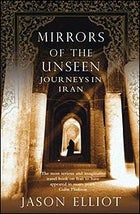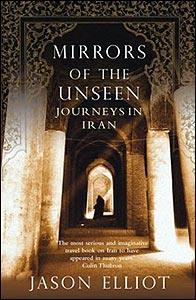CHAOS, GLOOM, CONFUSIONwhat a great time to be a travel writer. Last year a crop of daring, even heedless authors returned from unflinching tours of the world’s sore spots, proving once again that no one gets a better grip on the planet than the long- suffering, far-wandering witness with a pen.
Want it? Get it.
Buy,
, and on Amazon.com.
Mirrors of the Unseen
 Mirrors of the Unseen: Journeys in Iran
Mirrors of the Unseen: Journeys in IranFor London-based Jason Elliot, the “whims and goals and prejudices” of travel are turned to unexpected shapes by the hard lathe of Iran. In Mirrors of the Unseen: Journeys in Iran (St. Martin’s, $27), he weaves three years of wanderingthrough the ruins of Persepolis, the stony mountains of the Assassinsinto an embrace of Persian culture and grudging respect for the Iranian revolution that cuts past clichés of mad mullahs and rave parties. It’s a more pacific account than his superior 1999 debut, An Unexpected Light, a sumptuous tale of summer breaks in the eighties spent fighting with the Afghan resistance (or at least raiding orchards in mujahedeen costume). But in Iran the Farsi-fluent Elliot, 41, renders transparent a civilization that somehow endures earthquakes, wars, and political storms.
Revolution’s aftermath is the theme for Jeffrey Tayler, 45, whose River of No Reprieve: Descending Siberia’s Waterway of Exile, Death, and Destiny (Houghton Mifflin, $24) returns the Atlantic Monthly correspondent to his adopted home and first love, the “exacting taskmaster” of rural Russia. For no more reason than that “the Lena [River] came to mind,” Tayler travels to Siberia and, with an amply stocked raft and outboard motor, descends 2,400 miles down the isolated river, where a merciless forest swallows the abandoned gulags of empire. He fends off alcoholic villagers, fascist hooligans, and mosquitoes the size of golf balls without losing his eloquence. The only explosions are the nightly “tridents of lightning” breaking over a river where “panes of liquid silver are speckled with raindrops.”
But it was The Prince of the Marshes and Other Occupational Hazards of a Year in Iraq (Harcourt, $25), a clear-eyed marvel by Scotsman Rory Stewart, that kept me up all night. Eton boy turned officer of the Black Watch, speaker of half a dozen languages (but little Arabic), dashing, 33-year-old Stewart made book-club hearts throb in early 2006 with The Places In Between, about his stroll through Afghanistan, in winter, weeks after the Taliban’s fall. He was resting up from that trek in 2003 when the Coalition Provisional Authority called, offering him seemingly limitless funds (the money would later arrive shrink-wrapped in “million dollar bricks”), a bodyguard detail of six, and 12 months to pacify a province in southern Iraq. Prince is Stewart’s diary of rebuilding schools, clinics, and self-government amid the Machiavellian scheming and sniper attacks of competing sects, tribes, armies, and egosall of which he faces with black humor reminiscent of Evelyn Waugh. “Tell you what, though,” a rollerblading British general advises him at one point, “you’ve got the plum job. Most fun province in Iraq.” Stewart emerges a year later defeated but unmuddied, convinced that good manners and humility would have gone further than shock and awe. His province is today aflame, and Stewart recently moved to Kabul, for the quiet. His books, like those of Elliot and Tayler, prove that literate and urgent travel writing is alive and well.


